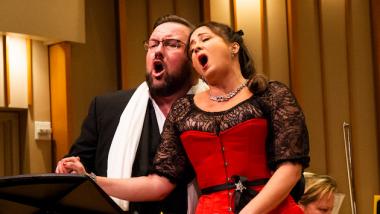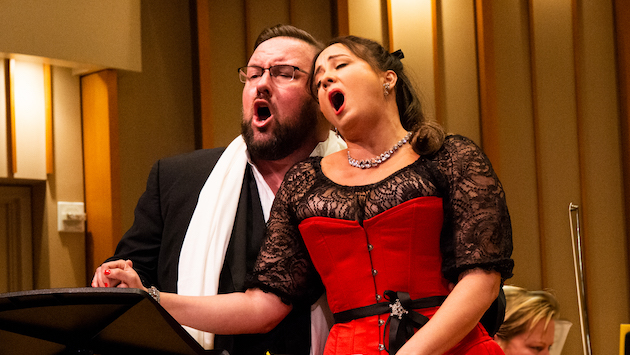
After a miscalculated inaugural production of Alexander Zemlinsky’s Der Zwerg at the vast Theatre at Ace Hotel (with piano accompaniment), fledgling Numi Opera, whose goal is to promote rarely heard works by composers impacted by the rise of Nazi Germany, decided to make a much needed course correction.
Rather than trying to compete with big budget companies like LA Opera, Numi Opera decided to focus its resources on musical quality on a smaller scale in a more intimate setting.
The result was a buoyantly light concert performance, on Thursday night, of Eric Wolfgang Korngold’s one-act comic opera Der Ring des Polykrates at the Colburn School’s acoustically bright Zipper Hall. The small stage was filled to overflowing with a chamber orchestra that featured many of LA’s top studio musicians and a melodious quintet of vocalists who performed with scores in hand. The performance was skillfully conducted by Lyric Opera of Chicago and Santa Fe Opera veteran, Francesco Milioto.
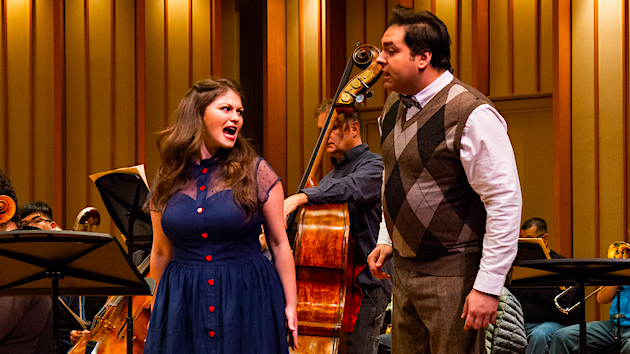
Sadly, because they were competing with the hustle and bustle of the holidays, minimal promotion, and the big event in town — the opening of Star Wars: The Rise of Skywalker — the hall’s 300-plus seats were barely half full. Those that did attend, however, were treated to an enchanting performance of Korngold’s rarely performed whip cream light domestic comedy, originally set in 18th-century Saxony, here (with simple costuming) updated to the 1950s.
Korngold was a 17-year-old rising star in 1914, when Der Ring des Polykrates had its premiere in Munich, conducted by Bruno Walter. His compositional skill was mature well beyond his years, influenced by his teacher Alexander Zemlinsky, the epic scope of Wagner and, particularly, the operas and tone poems of Richard Strauss. It’s impossible not to hear many a wafting reference to Der Rosenkavalier or the influence of Strauss’s Don Juan that would later dominate Korngold’s scores for The Adventures of Robin Hood and Captain Blood. In fact, one cannot imagine John Williams being able to craft his iconic scores for Star Wars had Korngold not been forced to abandon his native Vienna and follow his star to the soundstages of Hollywood.
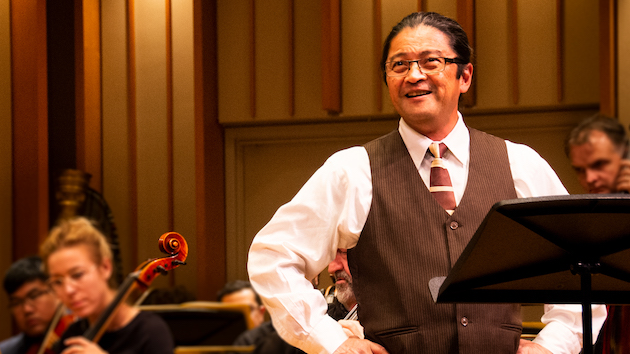
Der Ring des Polykrates takes its title from a 1797 lyric ballad by Fredrich Schiller, Der Ring. It was later transformed into a comic parody by Heinrich Teweles, then into the opera’s libretto by Leo Feld.
In the Greek myth, King Polykrates is warned against the sin of hubris and urged to make a sacrifice to the gods in order to avoid their wrath. In Korngold’s opera, the kingly character becomes the exceedingly successful composer Wilhelm Arndt, sung by tenor Scott Ramsay. Arndt has it all: his career is thriving, he’s inherited money, and he is madly in love with his newlywed wife, Laura (soprano Shana Blake Hill).
Things get knocked off-kilter with the arrival of Arndt’s one-time friend, Peter Vogel (baritone Roberto Perlas Gomez). He sees in Arndt’s life everything his own life lacks. Spurred by jealousy, he plants the notion that the composer risks the sin of hubris if, like Polykrates, he does not make a sacrifice. He must ask his wife “The Fateful Question,” did she love someone before she met him? As it turns out she did, though it was just a passing infatuation. Nevertheless, it is a secret Laura has safely guarded.
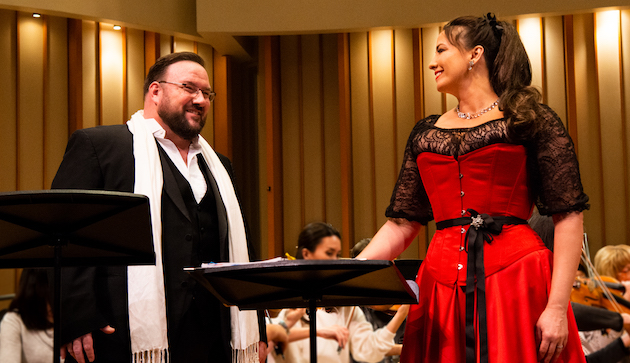
Korngold gave the whole thing its appropriate Viennese mix of romantically swelling themes, a passionate aria of reflection for Laura, dulcet duets for the couple, and snippy repartee from Vogel and the house’s two domestics: the composer’s loyal copyist Florian Döblinger (tenor Alex Boyer) and the saucy chambermaid Lischen (soprano Emily Rosenberg).
The ensemble cast was consistently strong and they blended perfectly in the opera’s climactic quintet. Ramsay projected a good natured, deliciously self-satisfied aura, as well as being gullible enough to accept his “friend’s” marriage-rocking proposition.
Hill’s soprano was lush and she strikes an elegant stage presence. The noteworthy surprise was the bright, clear tenor voice of Boyer, a product of the Merola and Santa Fe Opera apprentice program. For her part, Rosenberg brought a nice Zerlinaesque feistiness to her role as Lieschen, with Gomez adding just the right yeast of envy to makes Korngold’s confection rise.
By necessity the performance had to scale down the opera’s grand orchestral score. But the briskness of Milioto’s conducting, the highly skilled musicianship of the players, and the smaller scale of the hall all worked together to produce an impressively satisfying experience.
In 1916, Korngold followed up the success of Der Ring des Polykrates with a second, more darkly tinged one-act opera, Violanta, and the two operas were often paired together. Perhaps for its second season Numi Opera will complete the set.

